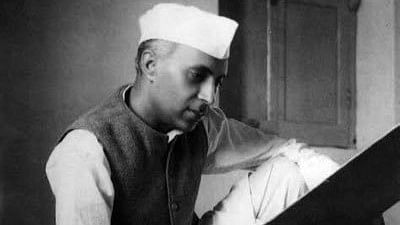
Jawaharlal Nehru.
Credit: X/@jnmfsm
In late 1999, when TIME magazine brought out its special millennium edition, two writers were mentioned as the finest writers of English in the twentieth century. One was Bertrand Russell; the other was Jawaharlal Nehru.
To be recognised globally among the foremost writers was no mean achievement for someone like Nehru, who was not a full-time writer or historian by vocation but who juggled writing while fighting for India’s freedom and later as a politician and prime minister.
Indeed, Nehru can be counted as the only world leader, the exception being perhaps Winston Churchill, with such an impressive literary oeuvre and an enduring appeal.
Nehru wore many hats and is remembered for many things he achieved during his lifetime. But what remains timeless are his writings, something to cherish and remember on his 135th birth anniversary on November 14. His writing was singularly unique in more ways than one; it had meaning, it was informative, and whatever he wrote touched the reader.
Remarkably, Nehru was a man of action who wrote not as a relief but by instinct and who found literary expression a means of discipline, both for thought and action. He certainly could not have been so prolific and written so much of value and beauty even during periods of imprisonment if he had found the demands of writing too exacting.
Nehru was a literary giant in his own right. His books had some interesting and essential nutrition at a time when it was very important for Indians to be well informed and well read. They are classics of their own kind with a certain freshness and remaining significant as works of contemporary history even today.
Glimpses of World History, a classic in its own right, is among the first works about the history of the world by a writer of a country subject to colonialism.
A collection of 196 letters on world history, societies, cultures, wars, dynasties, science, etc., written from prisons, it is a panoramic sweep of the history of humankind.
An Autobiography is unique in many ways. While Nehru indulges in much introspection about his own identity, it is equally history with much delving into the past. Ancient India, mediaeval India, and modern India are brought to life as in no other history. It is also the story of political struggle, and the interweaving of his own story with the story of India and the world makes it a compelling read. The book holds its own in Indian political literature.
Discovery of India details the rich history and cultural heritage of India from prehistoric times to the final years of British rule, an analysis of the Vedas, Upanishads, the Ramayana and the Mahabharata, the religions, the culture, the science, the arts, and much more. Even if it is a story of the past, he succeeds in bringing the past to the present and in sharing the agelessness of India and her capacity for change.
The book is a mature work. The Discovery is his discovery; it could be any Indian’s but only an Indian’s. Through this book, Nehru was also driving home the message that there was no point fighting for the country’s freedom if you didn’t know what India was all about.
Any wonder why many believe there is no other book about the cultural unity of India or the continuity of Indian civilisation other than Nehru’s Discovery?
Nehru’s letters are class by themselves. During periods of imprisonment, the only outlet for his emotions, apart from the books he wrote, were letters. His letters fall under two categories: those written to friends and colleagues in public life and those written to members of his family, mainly his daughter Indira and two sisters.
The classic Letters from a Father to a Daughter tells the story of the world, the rise and fall of civilisations, and major world events. The letters are written in a simple, lucid, and at times poetic manner, revealing the human side of Nehru.
A Bunch of Old Letters is a collection of 368 letters Nehru exchanged with leading personalities of the time, including Mahatma Gandhi, Subhash Chandra Bose, Sardar Patel, and Sarojini Naidu, vividly capturing the spirit of India facing numerous challenges yet driven by the new nationalistic fervour.
The birth of the National Herald in 1938, started by Nehru, was as significant in the development of Nehru as a writer and a world figure as the earlier times of imprisonment. The newspaper, started along with other freedom fighters, was meant to voice the aspirations and struggles of the masses and highlight the progress of the freedom movement.
Undoubtedly, Nehru was a talented and expressive writer, prompting the visiting American journalist John Gunther to remark: “Hardly a dozen men alive write English as well as Nehru.”
(The writer is a Bengaluru- based independent journalist)